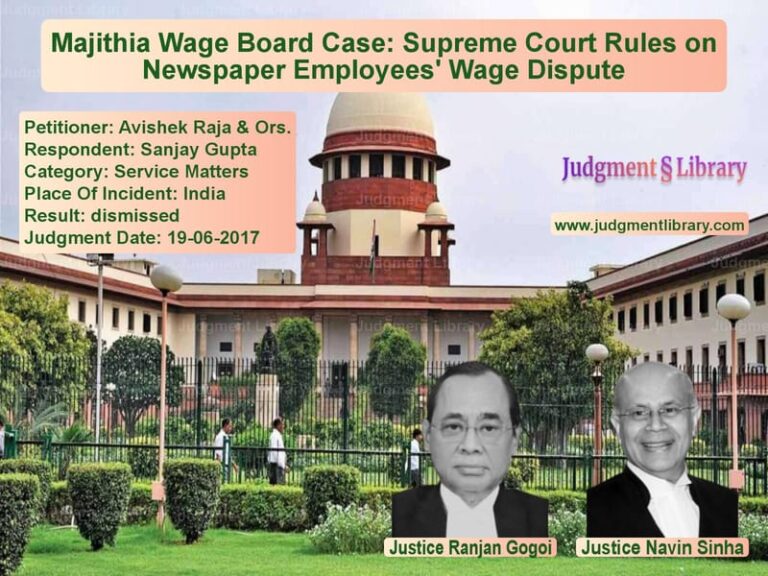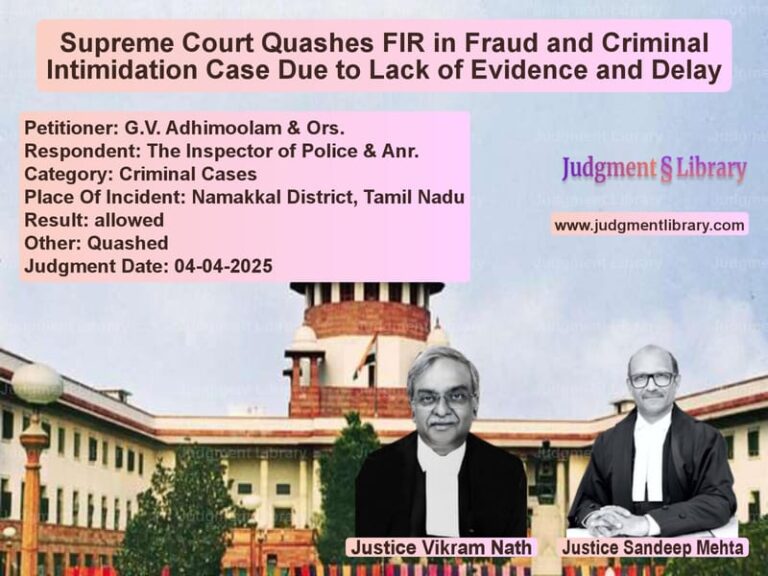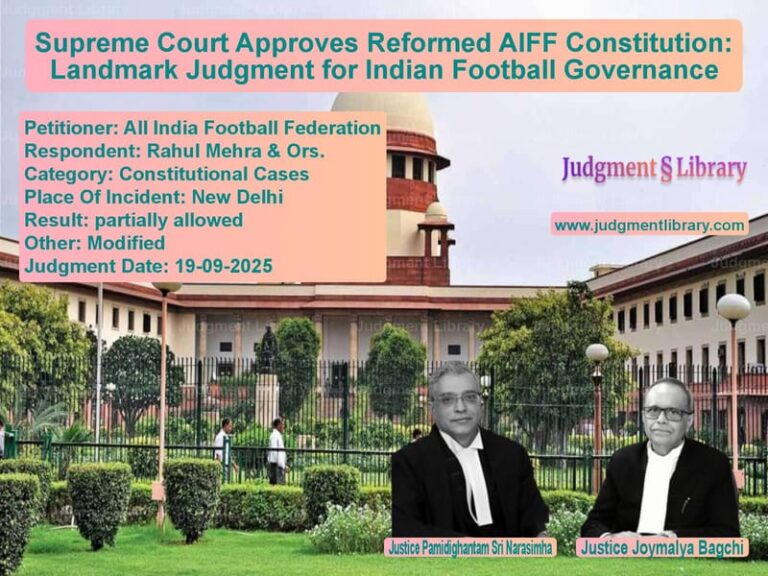Natural Justice in Membership Expulsion: Supreme Court Upholds Fairness in Tamil Nadu Chamber of Commerce Dispute
The Supreme Court of India, in the case of Tamil Nadu Chamber of Commerce and Industry v. P. Mahendravel & Others, delivered a landmark ruling addressing the principles of natural justice in organizational membership expulsion. The case revolved around the legality of the Tamil Nadu Chamber of Commerce and Industry’s decision to expel certain members, which was challenged by the affected individuals. The judgment, pronounced on August 1, 2018, by a bench comprising Justice Kurian Joseph and Justice Sanjay Kishan Kaul, reaffirmed the requirement of due process in organizational decision-making.
Background of the Case
The Tamil Nadu Chamber of Commerce and Industry, a prestigious trade organization, had expelled several members, citing reasons of misconduct and violation of organizational norms. The expelled members approached the civil court, contesting the legality of their expulsion. The trial court ruled in their favor, declaring the expulsion illegal on the grounds of violation of natural justice.
Unhappy with this ruling, the Chamber escalated the case to the First Appellate Court, which upheld the trial court’s decision. The Chamber further challenged the ruling in the Madras High Court, but the decision once again favored the expelled members. Left with no other recourse, the Chamber moved the Supreme Court, seeking relief.
Petitioners’ Arguments
The Tamil Nadu Chamber of Commerce and Industry, through its legal representatives, presented the following arguments:
- The expelled members had engaged in activities that were against the interests of the association.
- The Chamber had the inherent right to regulate its membership and maintain discipline within the organization.
- The expulsion was conducted as per the rules and regulations of the Chamber’s constitution.
- The decision to expel members was taken in good faith, ensuring that the integrity of the organization remained intact.
- Courts should not interfere in the internal management of private organizations.
Respondents’ Arguments
The expelled members countered the Chamber’s claims, arguing that:
- The expulsion process lacked procedural fairness and was executed without giving them an opportunity to be heard.
- The Chamber failed to follow the principles of natural justice by not allowing the affected members to present their case.
- The High Court had correctly ruled in their favor, emphasizing that organizational decisions must adhere to legal standards.
- Expulsion from a trade association had serious repercussions on their professional lives and businesses, making a fair hearing imperative.
- The judiciary had the power to intervene in cases where the fundamental rights of individuals were violated by private bodies.
Supreme Court’s Observations
The Supreme Court meticulously examined the facts and legal precedents before delivering its judgment. The key observations of the Court were:
- The Chamber’s actions in expelling members violated the principles of natural justice as the expelled members were not granted a fair hearing.
- The expulsion decision was made arbitrarily without sufficient justification or transparency.
- The Chamber had failed to substantiate how the conduct of the expelled members posed a legitimate threat to the organization.
- The trial court, the first appellate court, and the High Court had correctly ruled in favor of the expelled members.
- All parties had voluntarily agreed to refer the matter to Justice A.R. Ramalingam, a retired judge of the Madras High Court, for independent arbitration.
- The Chamber could not later contest the validity of the arbitration process since it was mutually agreed upon by both parties.
Final Judgment
After reviewing the evidence and arguments, the Supreme Court ruled:
- The expelled members were entitled to challenge their expulsion before the courts.
- The findings of Justice A.R. Ramalingam, who conducted the arbitration, were binding on both parties as per their prior agreement.
- If the expelled members wished to challenge the arbitration report, they could do so in the appropriate forum.
- The Chamber’s objection that the arbitration report could not override judicial decisions was unfounded, as all parties had voluntarily submitted to the arbitration process.
- The expelled members could seek reinstatement through the appropriate legal process or offer an unconditional apology to the Chamber to regain membership.
- The Chamber was advised to consider reinstating members who genuinely sought reconciliation.
Impact of the Judgment
The Supreme Court’s ruling set a crucial precedent for cases involving membership expulsions in private associations. The judgment emphasized the following principles:
- Natural Justice Must Be Upheld: Private organizations cannot make unilateral decisions without granting affected individuals an opportunity to be heard.
- Judicial Oversight on Private Bodies: Courts have the authority to review decisions made by private associations when fundamental rights are violated.
- Validity of Alternative Dispute Resolution: When parties voluntarily agree to arbitration or mediation, the resulting findings must be respected.
- Reconciliation as a Remedy: The judgment encouraged reconciliation between expelled members and the Chamber, promoting a more amicable resolution.
Conclusion
The Supreme Court’s decision in Tamil Nadu Chamber of Commerce and Industry v. P. Mahendravel & Others highlights the importance of fair and just decision-making processes within private organizations. By upholding the right of the expelled members to challenge their removal and emphasizing the role of natural justice, the judgment serves as a significant ruling in cases involving institutional governance. The Court’s directive that the Chamber consider reinstating members who seek an amicable resolution further reinforces the spirit of fairness and due process in organizational affairs.
Petitioner Name: Tamil Nadu Chamber of Commerce and Industry.Respondent Name: P. Mahendravel & Others.Judgment By: Justice Kurian Joseph, Justice Sanjay Kishan Kaul.Place Of Incident: Tamil Nadu.Judgment Date: 01-08-2018.
Don’t miss out on the full details! Download the complete judgment in PDF format below and gain valuable insights instantly!
Download Judgment: Tamil Nadu Chamber o vs P. Mahendravel & Oth Supreme Court of India Judgment Dated 01-08-2018.pdf
Direct Downlaod Judgment: Direct downlaod this Judgment
See all petitions in Contract Disputes
See all petitions in Damages and Compensation
See all petitions in Other Cases
See all petitions in Judgment by Kurian Joseph
See all petitions in Judgment by Sanjay Kishan Kaul
See all petitions in dismissed
See all petitions in settled
See all petitions in supreme court of India judgments August 2018
See all petitions in 2018 judgments
See all posts in Civil Cases Category
See all allowed petitions in Civil Cases Category
See all Dismissed petitions in Civil Cases Category
See all partially allowed petitions in Civil Cases Category







